Today is the first day of Sharon Salzberg’s 28-Day Meditation Challenge. For those of you who are new to meditation, we’ve excerpted a section of her book, Real Happiness, below, to clear up some misconceptions about what meditation is (and isn’t). If, after you read this, you’re interested in the free February challenge, click here to sign up.
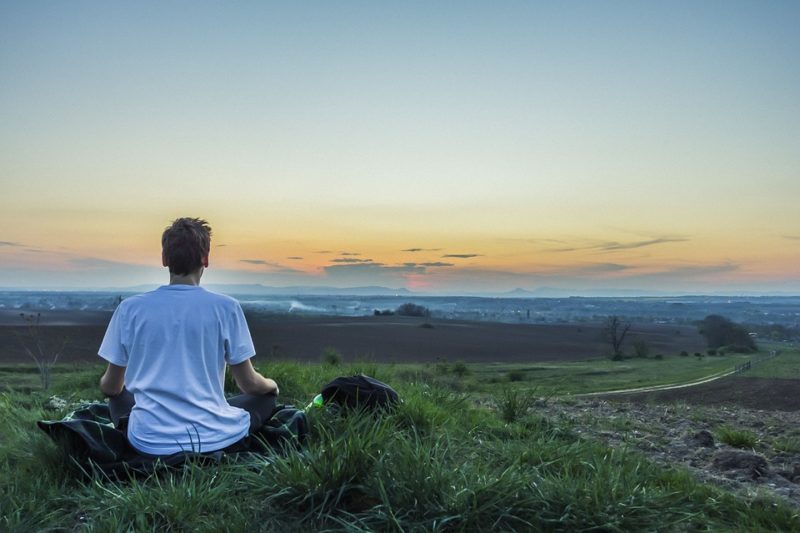
What Meditation Isn’t
It isn’t a religion. You don’t have to be a Buddhist or Hindu; you can meditate and still practice your own religion or no religion at all. Ben, the soldier who meditated while he was serving in Iraq, told me he thought the practice would help him stay in touch with his Christian values. The techniques you’ll learn in this book can be done within any faith tradition. They can also be done in an entirely secular way.
It doesn’t require special skills or background. Meditation isn’t only for certain talented or already serene people. You don’t have to be an ace at sitting still; you don’t have to wait until you’re uncrazed and decaffeinated. You don’t need to study anything before you begin. You can start right now. If you can breathe, you can meditate.
It doesn’t demand a huge chunk of your time every day. We’re going to aim for twenty-minute sessions. If you like, you can start with five minutes and work your way up. You’ll probably want to lengthen your practice sessions, because you’re going to like the sense of well-being they generate. But you don’t have to. Establishing a regular practice, whatever the length of the session, is more important than striving to devote hours to it each day.
It doesn’t eliminate sadness or rough patches from your life. You’re still going to have ups and downs, happiness and sadness. But you’ll be able to roll with the punches more and feel less defeated, because meditation teaches us new ways of coping with difficulties.
It isn’t an attempt to stop thinking or insist on only positive thoughts. That’s not humanly possible. Meditation is a way to recognize our thoughts, to observe and understand them, and to relate to them more skillfully. (I like the Buddhist tradition of replacing the modifiers “good” and “bad” to describe human behavior with “skillful” and “unskillful.” Unskillful actions are those that lead to pain and suffering; skillful actions are those that lead to insight and balance.)
You don’t have to renounce your opinions, goals, or passions; you don’t have to shun fun. “If I start meditating,” a woman once asked me, “do I have to give up wanting things?” “No,” I told her. “You just have to relate differently to the wanting—pay attention to it, investigate it, understand what’s behind it.” Adding meditation to our lives doesn’t mean withdrawing from the real world of relationships, responsibilities, careers, politics, hobbies, celebrations. In fact, it frees us to be more engaged with the things that interest us, often in a healthier way.
It’s not navel gazing. Meditation isn’t self-indulgent or self-centered. Yes, you’ll learn about yourself—but it’s knowledge that will help you better understand and connect with people in your life. Tuning in to yourself is the first step toward tuning in to others.
To learn more, check out Sharon’s book below.
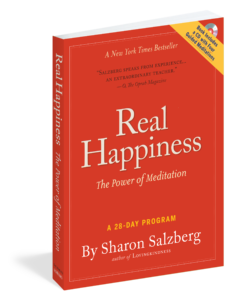 About the Book:
About the Book:
Thousands of years prove it, and Western science backs it: Meditation sharpens focus. Meditation lowers blood pressure, relieves chronic pain, reduces stress. Meditation helps us experience greater calm. Meditation connects us to our inner-most feelings and challenges our habits of self-judgment. Meditation helps protect the brain against aging and improves our capacity for learning new things. Meditation opens the door to real and accessible happiness.
There is no better person to show a beginner how to harness the power of meditation than Sharon Salzberg, one of the world’s foremost meditation teachers and spiritual authors. Cofounder of the Insight Meditation Society, author of Lovingkindness, Faith, and other books, Ms. Salzberg distills 30 years of teaching meditation into a 28-day program that will change lives. It is not about Buddhism, it’s not esoteric—it is closer to an exercise, like running or riding a bike. From the basics of posture, breathing, and the daily schedule to the finer points of calming the mind, distraction, dealing with specific problem areas (pain in the legs? falling asleep?) to the larger issues of compassion and awareness, Real Happiness is a complete guide. It explains how meditation works; why a daily meditation practice results in more resiliency, creativity, peace, clarity, and balance; and gives twelve meditation practices, including mindfulness meditation and walking meditation. An extensive selection of her students’ FAQs cover the most frequent concerns of beginners who meditate—“Is meditation selfish?” “How do I know if I’m doing it right?” “Can I use meditation to manage weight?”
Buy the Book
Amazon | B&N | Indiebound | Workman


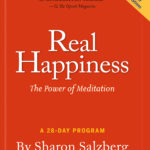
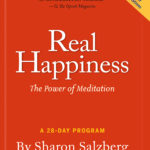
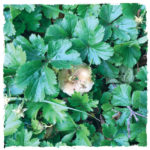
No Comments